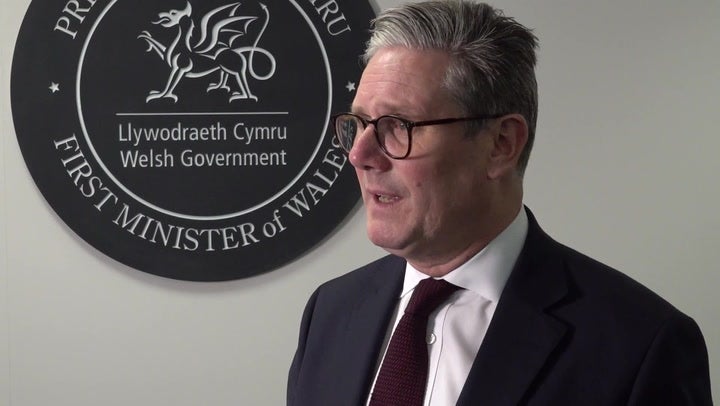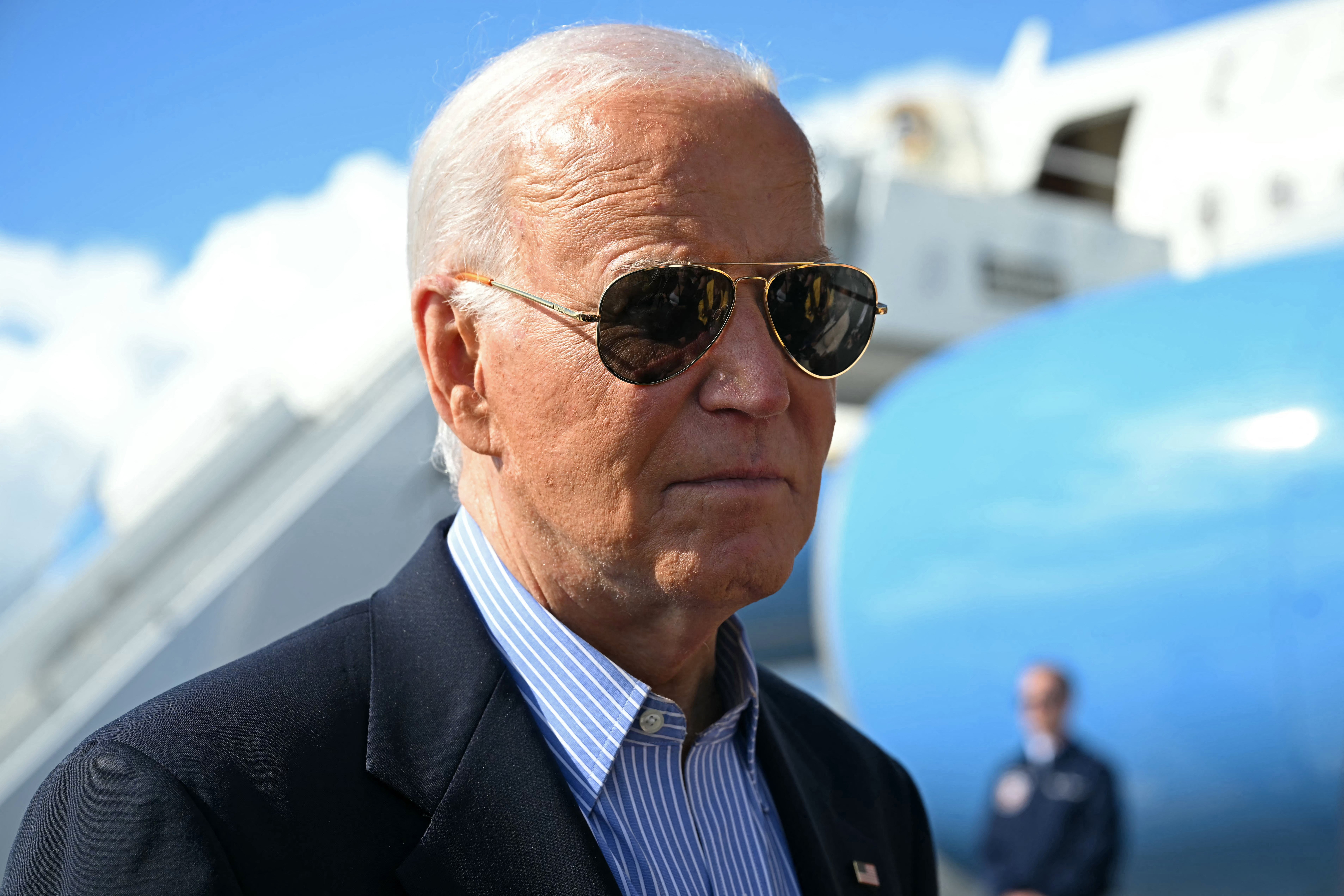Keir Starmer flies to Nato summit with ‘iron commitment’ on defence spending – but no timetable
Military chiefs hit out at Keir Starmer’s refusal to commit to a timeline for 2.5 per cent spending on defence as he flies to Washington for Nato summit
Your support helps us to tell the story
From reproductive rights to climate change to Big Tech, The Independent is on the ground when the story is developing. Whether it's investigating the financials of Elon Musk's pro-Trump PAC or producing our latest documentary, 'The A Word', which shines a light on the American women fighting for reproductive rights, we know how important it is to parse out the facts from the messaging.
At such a critical moment in US history, we need reporters on the ground. Your donation allows us to keep sending journalists to speak to both sides of the story.
The Independent is trusted by Americans across the entire political spectrum. And unlike many other quality news outlets, we choose not to lock Americans out of our reporting and analysis with paywalls. We believe quality journalism should be available to everyone, paid for by those who can afford it.
Your support makes all the difference.Sir Keir Starmer has doubled down on his “iron commitment” to increase defence spending to 2.5 per cent but waded into a row with military chiefs as he failed to set a timetable to meet his pledge.
The new prime minister has flown to the Nato summit in Washington DC with his wife Victoria for his first international visit since winning the general election last week.
With the situation at crisis point in Ukraine after Vladimir Putin’s Russian army bombed a children’s hospital and Voydymyr Zelensky’s forces warned they are running out of ammunition, the defence gathering is being billed as the most important since the invasion began.
During the recent UK election campaign, Sir Keir was challenged repeatedly by his predecessor Rishi Sunak whether he would meet the Conservative commitment to 2.5 per cent of GDP on defence by 2030 after the Tories tried to make it an issue for voters.

While the prime minister continues to resist setting a date to match the spending rise, he has revealed he will launch his first Strategic Defence and Security Review next week, which should provide a timetable and priorities on spending.
On the flight to Washington on Tuesday, Sir Keir said: “We will carry out our strategic review to look at the challenges. the capabilities, and on the back of that make further plans. I’m committed to the 2.5 per cent within our fiscal rules, [but] that strategic review needs to come first.”
He added: “Today, tomorrow, and the next day is all about standing together with our allies … discussing practically how we provide further support for Ukraine and send a very, very clear message to Putin that we will stand against Russian aggression wherever it is in the world.”
Earlier Sir Keir said: “There is no more important duty for me as prime minister than keeping the people of our country safe. At a time when we face multiple threats at home and abroad, we must make sure we are ready to defend ourselves.”
But the prime minister is coming under increasing pressure domestically and internationally.
General Sir Richard Dannatt, the former head of the British army, told The Independent: “I would like to see [the prime minister] put a timeframe on 2.5 per cent – at least to match the previous government’s pledge of ‘by 2030’. This will allow the MoD to plan with more certainty. A vague promise is not really that helpful.
“And he should be warned that once 2.5 per cent is locked in, there will be further pressure to go to 3 per cent, unless the European security environment improves dramatically in the next few years.”
Former UK national security adviser Lord Ricketts said Sir Keir needed to outline a timetable “soon”.
He said: “The iron commitment is useful going into the Nato summit where there will be a lot of focus on European allies increasing defence budgets. But if Starmer is to occupy the vacant position of European leadership on this issue... he will need to put a timetable on this soon: for example at the budget expected in early September.”
Former colonel James Sunderland, who was also a Tory MP until the election, said the prime minister “will come under increasing pressure from Nato to set a timeline for 2.5 per cent. It’s important that strong UK leadership is maintained, particularly in respect of Ukraine.”
Meanwhile, former armed forces minister Mark Francois added that the summit was the “perfect opportunity for our new prime minister to put a firm timing on when we will achieve spending 2.5 per cent – both to deter Russian aggression and ‘pour encourager les autres’ among our Nato allies.”
From Ukraine, Kyiv mayor Vitali Klitschko spoke exclusively to The Independent warning that urgent military aid is needed. He said: “We need more anti-missile systems, more modern air defence. We need, need them. If you help, you need to understand you are not just defending Ukraine but you are defending yourselves.”
Sir Keir is also set to have his first meeting with US president Joe Biden while he is in Washington in what many hope will be a reset of UK-US relations after the strains between the current White House and former Tory government over Brexit.

However, he will also be flying into controversy over the calls for Mr Biden to step aside as a candidate in November’s election after concerns about his health resurfaced in a recent debate with Donald Trump.
Sir Keir and his wife are set to have dinner with the Bidens in the White House on Wednesday night, raising hopes that the two leaders will become close partners on the world stage.
UK officials are also scrambling to find a location for the prime minister to watch England’s Euro 2024 semi-final match which will be at 3pm local time in the US.
While Sir Keir has been careful to note that he will work with whichever president US voters elect and is hopeful of negotiating a trade deal, he will be aware of Mr Trump’s threat to Nato over spending and the Republican nominee’s calls for a deal to be done with Putin.
Also at the conference will be Mr Trump’s political ally, Viktor Orban. In his role chairing the European Council of Ministers, the Hungarian prime minister has shocked many by going on a “peace tour”, including to Moscow, in a bid to open war-ending talks.
Sir Keir is set to have a number of bilateral talks, including with Italian prime minister Giorgia Meloni, who he has not previously met.
The UK’s security review will consider the nature of the threats to the nation – including Mr Putin’s ongoing invasion of Ukraine, continued instability in the Middle East, and the rise of authoritarian states – and the capabilities Britain needs to tackle them.
A major element will be deepening defence ties with Nato countries and other international partners.
The prime minister is also looking at creating a new European security pact.
Defence secretary John Healey, who will be at the summit and has recently visited Ukraine, said Britain’s commitment to Nato was “unshakeable”, adding: “We cannot have prosperity without security and we must never take our ability to live freely for granted.”
Foreign secretary David Lammy, who will also be attending, added: “Ukraine’s security is our security. Putin thinks he can outwait the West, but he is mistaken.”
Join our commenting forum
Join thought-provoking conversations, follow other Independent readers and see their replies
Comments